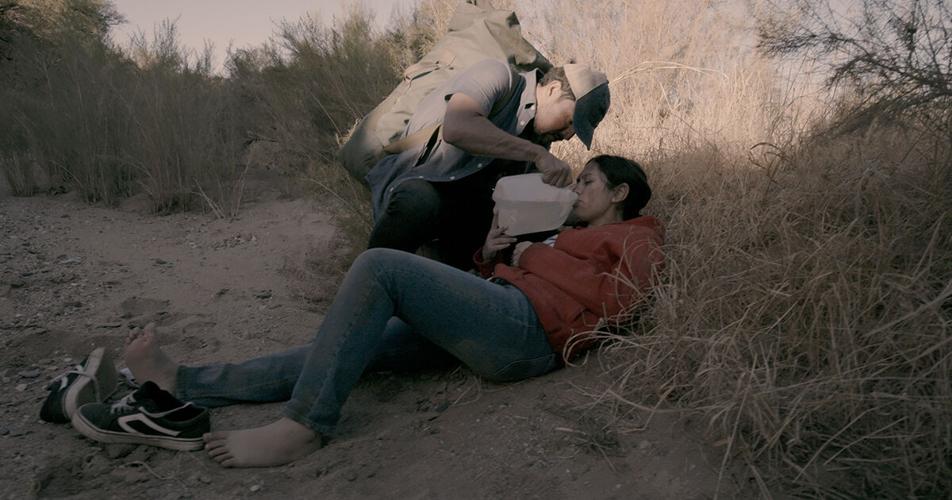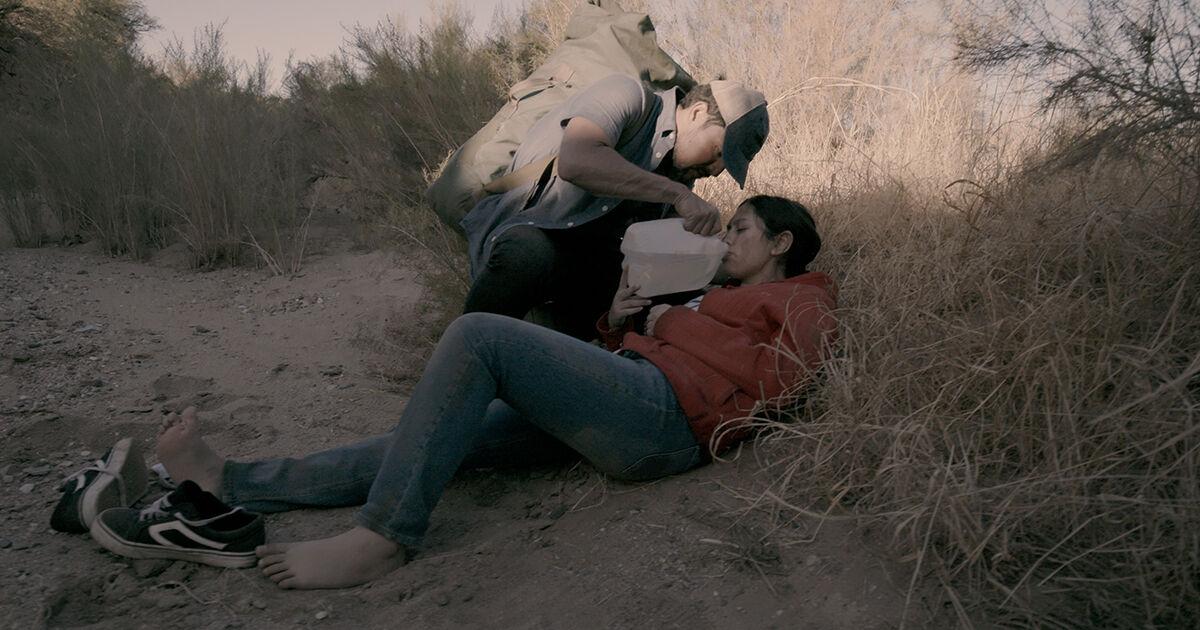A film that chronicles the “hero’s journey” of an undocumented New York City chef, on a harrowing trip through the Southern Arizona desert, aims to celebrate the contributions of undocumented immigrants to American society and to humanize migrants too often treated as political props, the filmmaker says.
“The Long Walk of Carlos Guerrero” is a fictionalized account rooted in true migrant stories from the Arizona borderlands, featuring appearances by real humanitarian-aid workers from Tucson and Green Valley, says New York-based Indian filmmaker Joseph Mathew-Varghese.
"I feel that migrants are heroes who have never been acknowledged,” said Mathew-Varghese, who is in Tucson for two upcoming screenings of the 2023 film, which he produced and directed. “They’re looked upon as a charge, and it’s exactly the opposite. They contribute so much to society.”
“The Long Walk of Carlos Guerrero” will be screened at the Arizona International Film Festival in Tucson on Friday, April 26 at the Mercado Annex.
It’s also the feature presentation of a Saturday, April 20 fundraising event in Green Valley to benefit humanitarian-aid nonprofit Salvavision, in collaboration with the Green Valley-Sahuarita Samaritans.
In the film, the protagonist Carlos Guerrero has taken the risk to leave the U.S. to visit his ailing mother in Mexico, and the only option for his return is to make the trek through the borderlands. When his group ends up scattered, he takes under his wing a young Salvadoran migrant who has lost her mother, as they both fight for their lives in the desert.
Salvavision’s co-founder Dora Rodriguez, a human-rights activist based in Tucson, said the film’s depiction of the Salvadoran girl reminds her of own near-death experience in the Southern Arizona desert in 1980, when she was 19 years old.

Dora Rodriguez, founder of migrant-aid nonprofit Salvavision, is pictured with filmmaker Joseph Mathew-Varghese, right, outside of the Southside Presbyterian Church in Tucson this week.
Rodriguez was part of a group of 26 who were fleeing the civil war in El Salvador and were abandoned by their guide in the July heat. Thirteen of them died, including three teenage girls, before Border Patrol agents found the survivors, including Rodriguez, in Organ Pipe Cactus National Monument.
In the decades since, Rodriguez has made it her life’s work to help migrants like herself.
Yet the deaths continue, despite increased awareness and the efforts of aid groups like Humane Borders, No More Deaths and the Samaritans, she said. Nearly 4,200 migrants are known to have died in the Southern Arizona borderlands since 1990, and thousands more are missing, according to Humane Borders.
“It’s hard for me to accept the fact that we are still in the same situation, and that people are still going through that journey,” Rodriguez said. “There’s people still dying, people still suffering just to find safety, and the lies and the betrayals of the smugglers continue.”
Proceeds from the Green Valley screening/fundraiser will support Salvavision’s efforts to create a healing summer camp experience for dozens of children who last year fled the Mexican border town of Sásabe, Sonora to escape extreme cartel violence, as well as children who migrated from other countries and are settling in Tucson.
About 20 kids, ages 6 to 14, will participate in the program, which will include art-therapy activities and field trips to the zoo, the Children’s Museum Tucson, Skate Country and a day at the movies, she said.
The program aims to “help them to have a space to leave their traumas behind for a little bit, to be children again,” Rodriguez said. “To have fun, to make new friends, to talk about what their experience was — how much they miss home, how much they love this country, or how it is hard to adjust.”
Undocumented labor ‘essential’
The film’s protagonist, Carlos Guerrero, represents an “homage” to the filmmaker’s late friend Carlos García, who died of cancer in 2015.
García was a celebrated chef in New York City, who had worked his way up from a dishwasher. He had previously been undocumented, and unable to visit his family in Mexico for more than 15 years. Mathew-Varghese was struck by how his friend’s immigration status “trapped” him, and so many others.
“The story revealed part of the undocumented experience that I had never thought about,” he said. “So many undocumented people are, in a way, trapped here. They can’t go back.”
Mathew-Varghese says the reliance on undocumented labor in major U.S. industries — from restaurants, to farming and food processing, to health care — while U.S. politicians continue to dehumanize immigrants and fail to create legal pathways for them, is hypocritical.
“If the undocumented people in this country leave, so many major industries that we rely on every day are just going to shut down,” he said. “It’s just like the reality that everybody knows, but nobody acknowledges.”

Mike Wilson, a humanitarian rights activist and member of the Tohono O'odham Nation, is pictured in a still shot from the film "The Long Walk of Carlos Guerrero," a 2023 film by Joseph Mathew-Varghese which will be screened at the Arizona International Film Festival on April 26.
That reality became obvious during the pandemic, he said. More than 5 million undocumented immigrants were deemed “essential workers” under U.S. Department of Homeland Security guidelines, as they worked on the front lines of the pandemic response, in health care and other key industries, according to the Center for American Progress, a nonpartisan progressive think tank.
Mike Wilson, a human rights activist and member of the Tohono O’odham Nation, is one of a number of Tucson-based humanitarians with a role in the film.
Wilson said he began putting out water on Tohono O’odham land around 2002, when he was a Presbyterian lay pastor at the Presbyterian church in Sells. He noticed the Humane Borders’ migrant-death map contained so many red icons on reservation land, marking the location where bodies were found.
“I thought it was my moral obligation and duty to put out water,” Wilson said. “They were dying within miles of our communities, and nobody was lifting a hand.”
Wilson met Mathew-Varghese in 2004 when the filmmaker was scouting a documentary in Arizona, after learning about the rising number of migrant deaths here and the way U.S. border-enforcement policy channels migrants to the most dangerous parts of the desert.
On his first morning in the field with Wilson, on a water drop, they came upon a man from Hidalgo, Mexico, who had been lost for days and was almost out of water. The man said he came to the U.S. to earn money to pay for surgery his wife needed.
Wilson gave the man water and food, and told him to find Border Patrol agents to turn himself in.
Mathew-Varghese was dumbfounded.
“It hit me in a very visceral way,” he said. “When I experienced that I was like, ‘This is it. If I can find this on the first day I’m out here, this must be a story.’”
The ensuing documentary, Crossing Arizona, was released in 2006 and many of the true stories the filmmaker gathered during filming are incorporated into his new film.
Rodriguez of Salvavision says she sometimes struggles to stay hopeful in the face of so much anti-immigrant sentiment, and the decades-long failure of Congress to tackle immigration reform in a realistic way.
But projects such as “The Long Walk of Carlos Guerrero” inspire her to continue her work — not for herself, but for the migrants coming behind her, she said.
“It is very easy for me to sometimes say, ‘Man, I’m done,’” she said. “And then, you get the beautiful victory of a good story to lift you up, and you say, ‘I cannot stop. I gotta keep going.’”
Tucson artist Álvaro Enciso wants to make a largely invisible tragedy unfolding in the Southern Arizona desert more visible to the world. For the past decade Enciso and his team of friends and volunteers from the Tucson Samaritans, have spent every Tuesday placing his hand-made crosses at the site of migrants' deaths.







